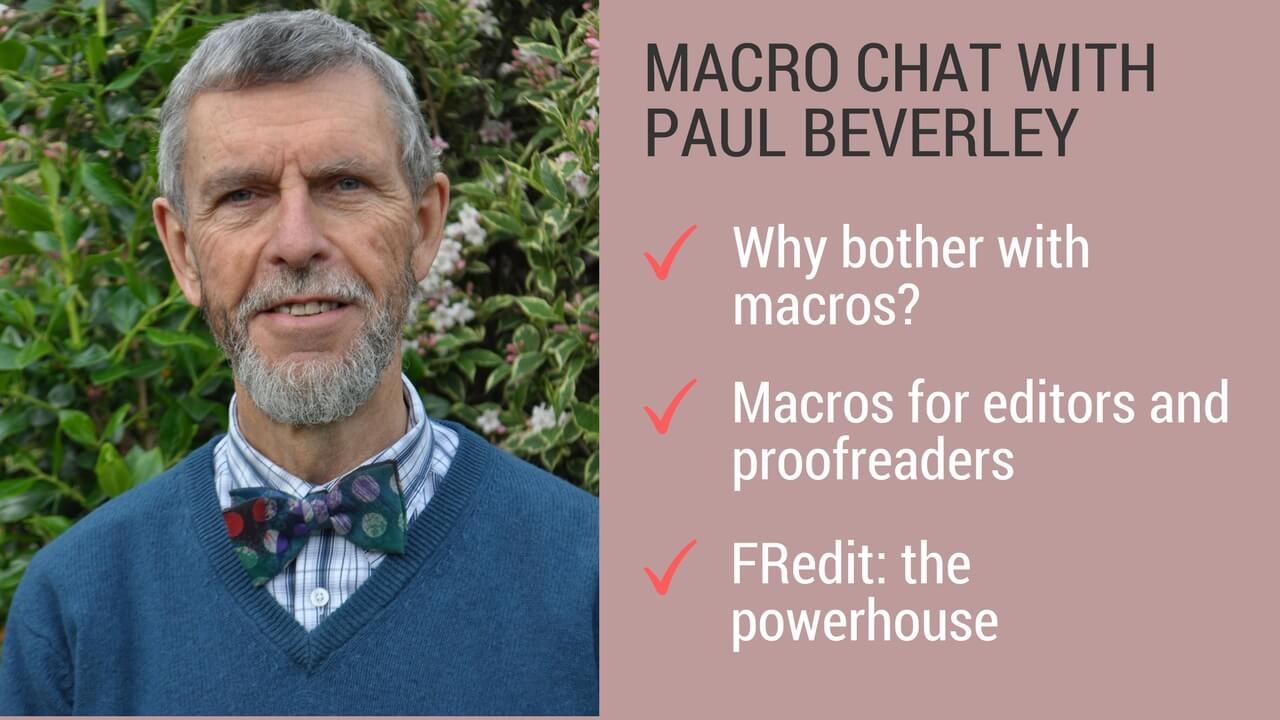|
Macro Chat is back! This is where I hand over the Parlour reins to my friend, macro king Paul Beverley. A lot has happened since March: Paul's written lots more macros (close on 600 now) and has created another couple of dozen screencasts, 45 in all (see the Resources at the bottom of the blog for more on that). So over to Paul ...
What can macros do for you?
More and more people are taking a deep breath and loading their first macro tool. (I say ‘macro tool’ to differentiate my pre-programmed macros from those that you can record for yourself.) But why bother? What can macros do for you? 'I’m a proofreader – is there any point?' Most definitely! The better view you can get of the (in)consistency within your document before you start reading, the more problems you’ll be able to spot as you read through. Did the client pass on the editor’s style sheet? Maybe, but anyway, you can easily analyse your document to find the predominant conventions and get a count of the exceptions:
'I’m an editor, but do I need 600 macros?' Absolutely not! Indeed, that’s part of the problem, knowing where to start. (Sorry!) But if I suggest a possible general strategy, maybe that will help.
Fine! Except that (3) is a massive over-simplification. Let’s dig a bit deeper, and see how a macro-aided editor might work. FRedit – the powerhouse The principle I use (for books, anyway) is that I make as many changes as I can globally, but I do it chapter by chapter. I do a number of global find and replaces (F&Rs) on chapter 1, but I keep a list of them, so that I can do the same ones again on chapter 2 as well, and I don’t forget any of them. But hang on! Couldn’t you get the computer to go through that list and do all those F&Rs for you? Absolutely, and that’s what FRedit does! And it doesn’t just do the F&Rs, it allows you to add a font colour or a highlight to each and every F&R, and/or to track change (or not) each one – do you really want to track change all those two-space-to-one-space changes? But isn’t global F&R dangerous, especially when you can do a whole string of F&Rs at the touch of a button? Definitely, so start with just a few F&Rs and build up confidence; but if you colour or track all the changes, you’ll be able to see, when you read chapter 1, any inadvised F&Rs, so you can remove them or refine them. To give an example, if you changed every ‘etc’ into ‘etc.’ you’d get ‘ketc.hup’, ‘fetc.h’, etc.. (sic)! So use a wildcard F&R: Find: ‘<etc>([!.])’ Repl: ‘etc.\1’ (without those quotes, of course). And you don’t even need to work out those wildcard F&Rs yourself – just look in the library of F&Rs (provided free with FRedit) and gain from other people’s wildcard expertise. As you refine your F&R list, chapter by chapter, more of the dross is sorted out before you read, so (a) you miss fewer mistakes (as there are fewer to find, as you read) and (b) you can concentrate more on the meaning and flow of each sentence and (c) the job is more interesting, involving fewer boring tasks. Enjoy! Resources
Louise Harnby is a line editor, copyeditor and proofreader who specializes in working with crime, mystery, suspense and thriller writers.
She is an Advanced Professional Member of the Chartered Institute of Editing and Proofreading (CIEP), a member of ACES, a Partner Member of The Alliance of Independent Authors (ALLi), and co-hosts The Editing Podcast. Visit her business website at Louise Harnby | Fiction Editor & Proofreader, say hello on Twitter at @LouiseHarnby, connect via Facebook and LinkedIn, and check out her books and courses.
0 Comments
Your comment will be posted after it is approved.
Leave a Reply. |
BLOG ALERTSIf you'd like me to email you when a new blog post is available, sign up for blog alerts!
TESTIMONIALSDare Rogers'Louise uses her expertise to hone a story until it's razor sharp, while still allowing the author’s voice to remain dominant.'Jeff Carson'I wholeheartedly recommend her services ... Just don’t hire her when I need her.'J B Turner'Sincere thanks for a beautiful and elegant piece of work. First class.'Ayshe Gemedzhy'What makes her stand out and shine is her ability to immerse herself in your story.'Salt Publishing'A million thanks – your mark-up is perfect, as always.'CATEGORIES
All
ARCHIVES
July 2024
|
|
|
|
















 RSS Feed
RSS Feed





